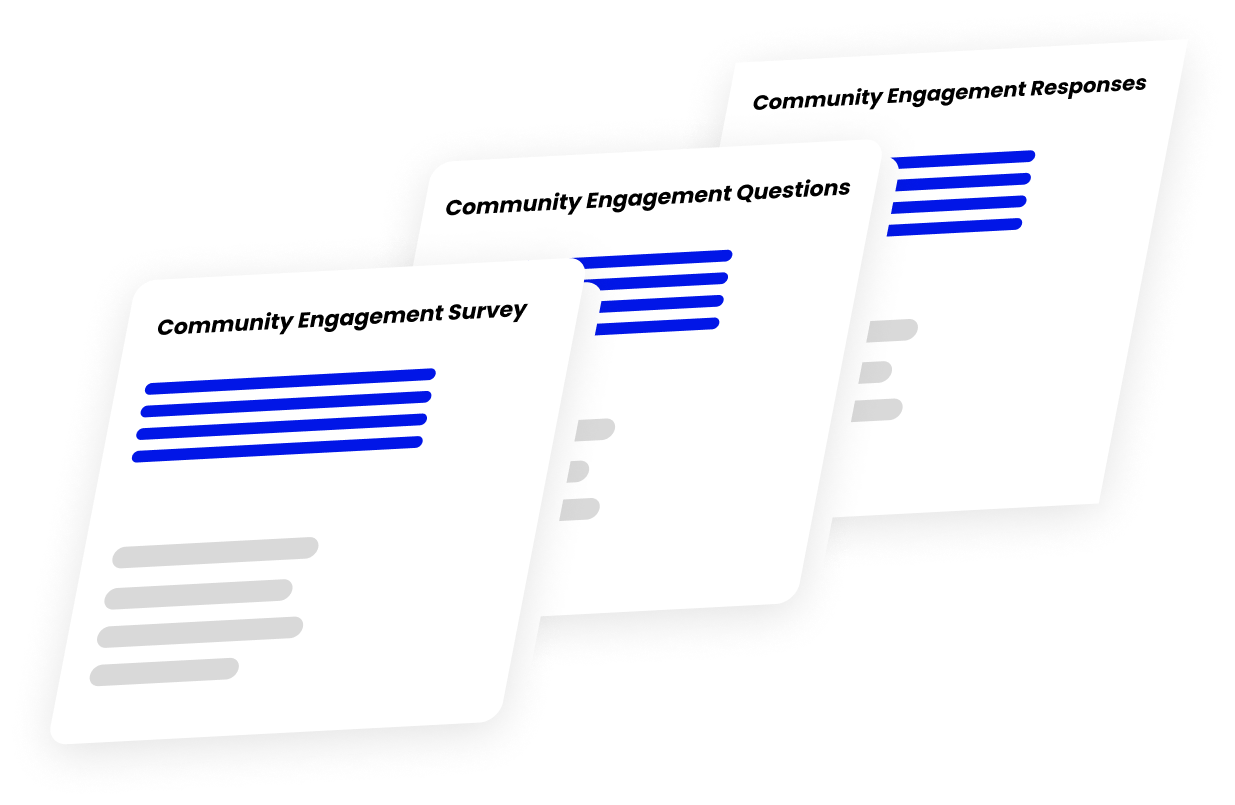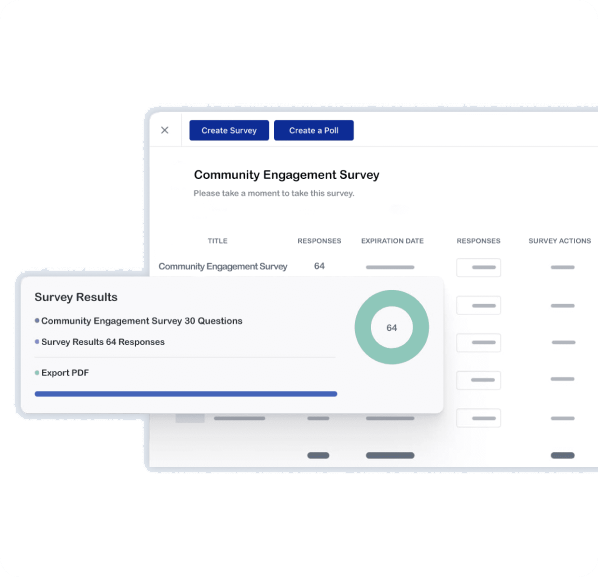Community Engagement Surveys
Community engagement surveys gather data on the level of engagement of a local government with its community. This information is used to assist with communication and outreach strategies.
What Is A Community Engagement Survey?
Community engagement surveys are research tools used by police departments to assess the needs and concerns of their communities, as well as opportunities for improving police services. These surveys can help identify ways to increase participation in community policing activities and strategies for strengthening the relationship between police and community members. By gathering this information, police departments can work to better understand and address the needs of their communities and build stronger, more positive relationships with the people they serve.
Community engagement surveys can provide police departments with data on the frequency of interactions between community members and law enforcement officers, as well as the level of satisfaction with communication between the two groups. By analyzing this information, police departments can identify opportunities for improving communication and outreach strategies, and work to enhance their relationships with the community. Police departments that have implemented Officer Survey have reported an increase in community satisfaction levels by 94% and a significant reduction in officer complaints.
Why Should It Be Done?
1. To gather valuable information: A community engagement survey can provide a wealth of information about a community’s attitudes, opinions, and concerns. This can be valuable for a local government or organization as it helps to identify areas for improvement and develop strategies for building stronger relationships with the community.
2. To improve communication and outreach: A community engagement survey can help identify the most effective ways to communicate with a community and develop strategies for improving outreach efforts. This can help improve the flow of information between a local government or organization and the community it serves.
3. To increase transparency: By conducting a community engagement survey, a local government or organization can demonstrate its commitment to transparency and accountability, and provide the community with an opportunity to provide feedback and input.
4. To foster community participation: A community engagement survey can help identify ways to increase community participation in local government or organizational activities and initiatives. This can help build stronger relationships with the community and foster a sense of ownership and responsibility among community members.
5. To address community issues and concerns: A community engagement survey can help a local government or organization identify and prioritize community issues and concerns, and develop strategies for addressing them. This can help the organization be more responsive to the needs of its community, and work more effectively to address problems and challenges.

Some of the benefits include:
- Identification of community needs.
- Assessment of community resources.
- To gauge the level of support for community initiatives.
- Identify important issues within the community.
- Receive feedback on community programs and services.
- To determine how well the community is being served.
- To solicit ideas from the community on how to improve services.
- Understand community thoughts on police officer interactions.
- To gauge the level of satisfaction with the community.
- Identification of community priorities.
- To receive input on community planning initiatives.
- To find out what the community thinks of its police department.
- Gathering valuable information about the attitudes, opinions, and concerns of a community.
- To get input on police resources and how to find them.
- To identify development of public safety services.
- To receive input on the quality-of-life issues.
- To outline the future goals of the community.
- Improving communication and outreach efforts with the community.
- To identify the key areas of interest for the community.
- To gauge the level of awareness of police services.
- To identify any barriers to community engagement with your organization.
- To assess how effective your community engagement activities have been.
- To assess the level of community support for your organization.
- To build relationships with the community.
- To identify potential partners for community initiatives.
- To get input from the community on planning and decision-making.
- To get input from the community on planning and decision-making.
- Encouraging community participation in local government or organizational activities and initiatives.
- To ensure the community is kept informed of your organization's activities.
- To solicit the community's suggestions for improving your organization.
Benefits of A Community Engagement Survey
1. Improved understanding of the community: A community engagement survey can help a police department understand the attitudes, opinions, and concerns of the community it serves. This can help the department identify areas where it can improve its relationships with the community, and develop strategies for building trust and confidence.
2. Improved communication: A community engagement survey can help a police department identify the most effective ways to communicate with its community, and develop strategies for improving outreach efforts. This can help the department keep the community informed about its activities and initiatives, and address any concerns or issues that may arise.
3. Enhanced transparency: By conducting a community engagement survey, a police department can demonstrate its commitment to transparency and accountability, and provide the community with an opportunity to provide feedback and input.
4. Increased community participation: A community engagement survey can help a police department identify ways to increase community participation in its activities and initiatives. This can help the department build stronger relationships with its community and foster a sense of ownership and responsibility among community members.
5. Improved problem-solving: A community engagement survey can help a police department identify and prioritize community issues and concerns, and develop strategies for addressing them. This can help the department be more responsive to the needs of its community, and work more effectively to address problems and challenges.

Some of the benefits include:
- Gaining a better understanding of the community's views and needs.
- Identifying areas of agreement and disagreement.
- Gauging the level of support for a particular issue or initiative.
- Identifying what people value most in their community.
- Identifying what people feel needs improvement in their community.
- Helping to build consensus and identify priorities.
- Providing a forum for community members to express their views.
- Helping to inform and shape decision-making.
- Facilitating communication between community members and decision-makers.
- Promoting transparency and accountability.
- Generating buy-in and support for decisions.
- It helps in building trust and relationships.
- Provides an opportunity for community members to have their say.
- Fostering a sense of ownership and responsibility for the community.
- Promoting social cohesion and community spirit.
- Helping to identify and address community needs and concerns.
- Providing an evidence base for decision-making.
- Enabling effective and efficient use of resources.
- Promoting best practice.
- Ensuring that the community's needs are met.
- Helping to prevent and resolve conflict.
- Protecting and promoting the rights of community members.
- Promoting and protecting the interests of the community.
- Empowering and giving voice to the community.
- Contributing to the overall health and wellbeing of the community.
